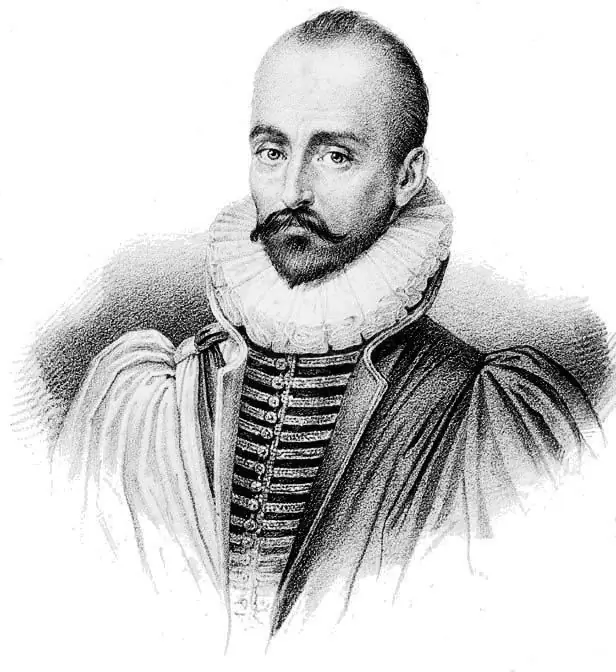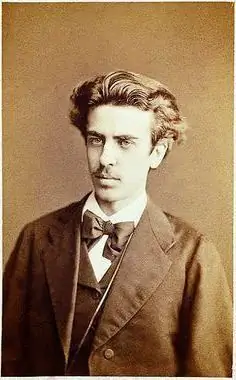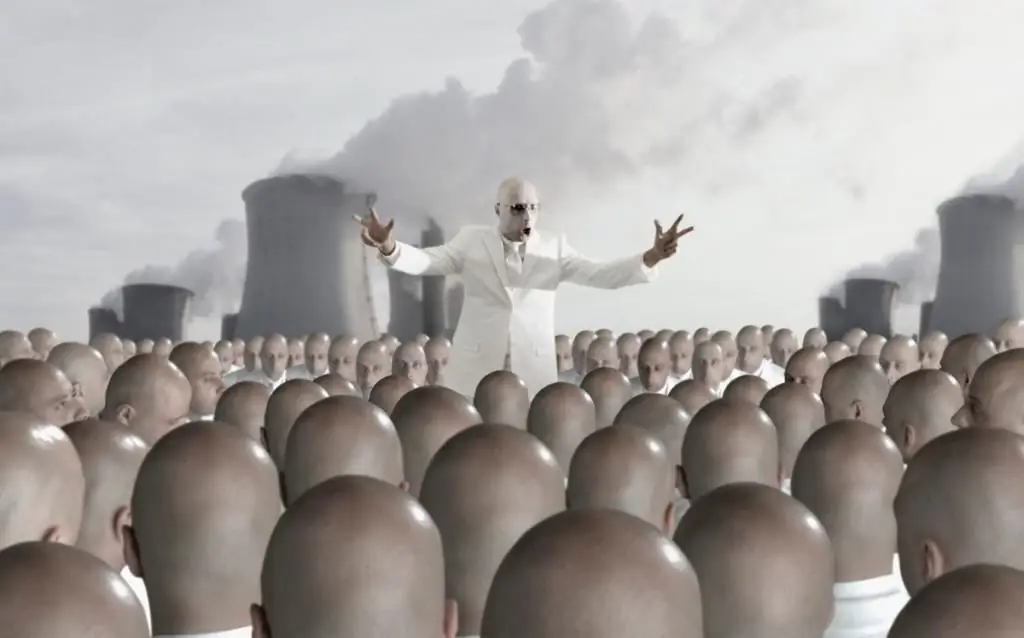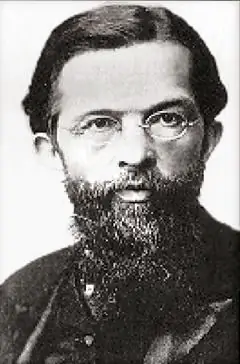- Author Henry Conors [email protected].
- Public 2024-02-12 02:47.
- Last modified 2025-01-23 09:07.
The name of the Russian philosopher Nikolai Fedorov was hidden from the general public for a long time, but he was not forgotten, because his ideas inspired such prominent scientists as Konstantin Eduardovich Tsiolkovsky, Vladimir Ivanovich Vernadsky, Alexander Leonidovich Chizhevsky, Nikolai Alexandrovich Naumov.
Russian philosophers of the 19th century and the first half of the 20th, Vladimir Solovyov, Nikolai Berdyaev, Pavel Florensky, Sergei Bulgakov and others highly appreciated the ideas of Fedorov, and Vladimir Nikolayevich Ilyin, in the article "Nikolai Fedorov and the Monk Seraphim of Sarov" puts these two people on one common level, paying tribute to the high spirituality and true Christian holiness of Nikolai Fedorovich.

Childhood and youth
The biography of N. Fedorov contains a lot of white spots. We cannot say whether he was married or had children. It is only known that Nikolai Fedorovich Fedorov was born on May 26 (June 7), 1829. About himthe mother's information was not preserved. He is the illegitimate son of Prince Pavel Ivanovich Gagarin. As illegitimate, neither Nicholas nor his brother and three sisters had the right to claim the title and surname of their father. Fedorov was his godfather. From him he got his last name. Such situations were not uncommon at that time: a nobleman could fall in love with a peasant woman, but divorce and marriage to a woman of a lower class deprived both spouses and their children of many privileges.
As for the surname, after Yuri Gagarin's flight into space, foreign media responded to this event with articles under the heading "Two Gagarins", implying the real name of Nikolai Fedorovich. Sergei Korolev had a portrait of a cosmist philosopher in his office and, of course, when deciding which of the guys to send into space first, he could not help but think of a good sign.
Father, Prince Gagarin, did not hide his extramarital affair from his brother, Konstantin Ivanovich Gagarin. He took part in the fate of his nephews. He undertook to pay for Nicholas's education. There is no information about other children. Nikolai left his native village Klyuchi (Tambov province, now Ryazan region, Sasovsky district) when he reached school age - he moved to Tambov, where he entered the gymnasium.
Lyceum Richelieu
After graduating from high school in 1849, Fedorov went to Odessa. There he entered the famous Richelieu Lyceum at the Faculty of Law. This is a very prestigious educational institution. In terms of importance, it was in second place after the famous Tsarskoye Selo Lyceum. According to the composition of the subjects studied, the quality of the taughtknowledge and rules, it was rather a university than a lyceum. Professors taught. Children from the most well-born and we althy families studied at the Richelieu Lyceum. Nikolai studied there for three years. After the death of his uncle, who paid for his studies, the young man was forced to leave the Lyceum and start an independent life. An illegitimate son, even endowed with great talents and high virtues, could not count on state subsidies in such an educational institution. However, three years of study were not in vain. Fundamental knowledge in the natural sciences and humanities obtained at the Lyceum was later very useful for the future philosopher, who laid the foundation for Russian cosmism.
Teacher and librarian
In 1854, Nikolai Fedorovich Fedorov returned to his native Tambov province, received a teacher's certificate and was sent to the city of Lipetsk to work as a teacher of history and geography. Until the end of the sixties, he was engaged in teaching activities in the county schools of the Tambov, Moscow, Yaroslavl and Tula provinces. From 1867 to 1869 he traveled to Moscow, where he gave private lessons to Mikhailovsky's children.

In 1869, Nikolai Fedorovich Fedorov finally moved to Moscow and got a job as an assistant librarian in the first public library opened by Chertkov.
Fedorov believed that the library is the center of culture that unites people who are not related by family ties, but who are close in their attraction to spiritual values - literature, art, science. He was against copyright law and activelypromoted the ideas of various forms of book exchange.
Rumyantsev Museum and students
In the Chertkovsky Library, Fedorov met the future father of astronautics, Konstantin Tsiolkovsky. Konstantin Eduardovich came to Moscow with the intention of getting an education at the Higher Technical School (now Bauman), but did not enter and decided to study on his own. Nikolai Fedorovich replaced his university professors. For three years, under the guidance of Fedorov, Tsiolkovsky mastered physics, astronomy, chemistry, higher mathematics, etc. The humanities were not forgotten either, to which, like rest, the evening was devoted.
When a few years later the library was attached to the Rumyantsev Museum, Fedorov N. F. made a complete cataloging of the combined book fund. In his free time from his main job, he worked with young people. Nikolai Fedorovich spent his modest salary on students, while he himself lived, adhering to the strictest economy, to the point that he did not use public transport and walked everywhere.

The essence of the theory of cosmism
Nikolay Fedorov is considered the father of Russian cosmism. The philosopher argued that after the discovery of the heliocentric system by Copernicus, medieval philosophy had to reconsider its ideas about the world order. Space prospects have set new tasks for mankind. As Tsiolkovsky said: “The earth is the cradle of mankind, but it is not forever for him to live in the cradle!”
It should be noted that Fedorov designated the science of philosophy as thought without action. In his opinion, thissooner or later leads to isolation from the subject of study and the denial of objective knowledge. Theoretical knowledge must be supported by practice, and its purpose should be the study of nature, life and death to control them.
The Universe has been mastered in such a meager volume that the conclusion suggests itself: the Lord created such a huge Cosmos in order to place in it all the people who have ever lived, and those who will be born in the future. There is no other way to explain it. Under the influence of this conclusion, Fedorov's Russian cosmism was born. Considering the Universe as a huge space, only a microscopic part of which is occupied by humanity, the philosopher associated this unnatural imbalance with the Christian doctrine of resurrection. The free space is prepared by the Creator to accommodate billions of people who have ever lived on Earth. You can read more about this in the collection of works by Nikolai Fedorovich, united by the title "Philosophy of the Common Cause". The development of human civilization should be aimed at the exploration of outer space, at the return to the physical life of people who lived before and are now buried. In this regard, it is necessary to create a new ethics that allows everyone to live in peace and harmony.

New Ethics
Nikolai Fedorovich was a religious man. He participated in the liturgical life of the Church, kept fasts, regularly went to confession and communed. In his opinion, the new ethics should develop on the basis of the Christian doctrine of the Trinity of God. As three different Essences of God - Father, Son and Holy Spirit,interact harmoniously, so the divided humanity must find a way of peaceful coexistence. The Divine Trinity is the antithesis of the Eastern mentality of the dissolution of the individual in the collective and Western individualism.
The best basis for building new relationships is ecology. Caring for nature, studying its laws and managing them should become the basis for uniting people of different nationalities, professions and levels of education. Science and religion have a lot in common. The Christian doctrine of the coming resurrection of the dead must be put into practice by scientists.

Resurrection of the dead
What is the general resurrection, according to Fedorov, is it the rebirth or re-creation of people? The philosopher argued that death is an evil that people must eradicate. Each person lives at the expense of the death of his ancestors, therefore, is criminal. This state of affairs must be corrected. The bills must be paid by the resurrection of the dead. The idea of resurrection should become a catalyst, bringing together representatives of science from all over the world for the sake of one common cause.
The mechanism of resurrection is based on the laws of physics - every physical body consists of molecules and atoms, which are held near each other by the energies of attraction and repulsion. All objects emit such waves. These phenomena must be studied and carefully investigated for the restoration of physical matter, that is, for the cultivation of the past inhabitants of the planet from the preserved biological material or for the collection of energies that made uppeople to materialize them in this way. There may be more resurrection options, as Fedorov suggests.

The philosophy of his model of social development includes the cultivation of new relationships between people. Since paradise is not an ephemeral space inhabited by the souls of the righteous, and not the abstract peace of the soul, resigned to reality, which it has no power to change, but the real physical world, it is necessary to remake or educate people in such a way that they forever say goodbye to dependence on vices known as hatred, envy, love of money, despondency, pride, idolatry, etc. It is also necessary to ensure that people do not suffer from physical stimuli, such as: illness, cold, heat, hunger, and others. This is a job for both scientists and the clergy. Science and religion must unite.
Nikolai Fedorovich drew two possible ways for the development of human civilization.
The relationship between the sexes
Nikolai Fedorov did not ignore this side of human relations. In our world, in his opinion, the cult of women and carnal love reigns. Relationships are driven by sexual instinct. More sensuality and very little empathy.
Matrimonial relations should be built according to the model of the Divine Trinity, when the union is not a yoke, and the individuality of a person is not a reason for discord. Love between men and women should resemble the love of children for their parents. However, not only lust is not allowed, but also its opposite - asceticism, just as complete egoism and absolute altruism.
Procreation will be perceived as fathering, that is, the creation of people for new worlds. Our sexual sensuality is an instinctive flight from death, and birth, in the current view, is the opposite of dying. Love for the ancestors will replace the fear of one's own death and transform into the re-creation of the fathers.
The first path humanity can take
Intelligentsia and scientists around the world will work to recreate the human gene pool. The armed forces will no longer be used for aggressive, mutually destructive purposes, but will be used to resist the elemental forces of nature, i.e. floods, earthquakes, volcanic eruptions, forest fires, etc.

Industry will stop making products that can be conditionally called toys for adults. The main production will be transferred to the countryside. This is where life will develop. Cities breed people of a consumer warehouse, prone to a parasitic mode of existence. Life in cities deprives them of he althy aspirations, limits them and makes them not only flawed, but unhappy.
Education for all is a prerequisite for the implementation of the resurrection plan.
Government will be carried out by the monarch, connected with his people by relations not of Caesar and his subjects, but of the executor of the will of God for the sake of all mankind.
Another way
Nikolai Fedorov assumed another way of development of human civilization, which would lead tous not to immortality and the resurrection of the dead, but to the Last Judgment and fiery hell. Russian cosmism is a real concept that has nothing to do with the utopian fantasies of science fiction writers. Fedorov's picture of the world looks incredibly believable, although he lived in an era before the scientific and technological revolution.
To the Last Judgment will lead an exaggerated sense of self-preservation, which will prevail over common sense. This will arise as a result of a departure from God, in the loss of faith in His providence, will, care and love for people. Out of a misunderstood sense of security, people will artificially synthesize food. Lust will prevail over love, unnatural marriages without childbearing will begin to appear. Animals and plants that pose a threat to he alth will be destroyed. Stop producing aircraft. In the end, people will begin to exterminate each other. That's when the Day of Wrath will come.
It's amazing that all this was written in the 19th century - Nikolai Fedorov died on December 28, 1903.

Sciences born from Fedorov's teachings
Nikolai Fedorovich Fedorov, without knowing it, inspired Konstantin Tsiolkovsky to devote his life to creating a new branch of science and technology - cosmonautics.
The order of the world order, formulated by Nikolai Fedorovich, conquered the minds of many of his contemporaries. It was Fedorov's ideas that gave rise to such sciences as space and heliobiology, air ionification, electrohemodynamics, and so on. According to scientists involved in the legacy that left"Moscow Socrates", as Fyodorov's friends and students called him, marked the vector and gave impetus to the development of universal human knowledge for many centuries to come. From his submission, a new view was born of the evolution of mankind, as an active process produced by the people themselves, working on the creation of an ideal noosphere.
Most of the records that Fedorov N. F. made for his students have survived. Nikolai Fedorovich did not publish his thoughts. His works were preserved by numerous students. Nikolai Pavlovich Peterson and Vladimir Aleksandrovich Kozhevnikov systematized them and published them in 1906. The entire edition was sent to libraries and distributed free of charge to those who wished.

During his lifetime, Nikolai Fedorovich never took pictures and did not allow himself to be drawn. However, Leonid Pasternak still secretly made one portrait. We placed it at the beginning of the article.
Conclusion
During the years of Soviet power in the USSR, when the space industry and science achieved very significant results, Nikolai Fedorov was known only in very narrow circles.
The top leaders of the Communist Party of the Soviet Union perceived Fedorov's teachings as too attached to the Christian idea of the universe, as a creative act of the Divine mind of the Holy Trinity - the Father, the Son and the Holy Spirit. His deeply religious view of the world order came into conflict with the basic principles of Soviet society's attitude to the world order, which was aimed at satisfying only the material needs of man. main sloganSocialism: “From each according to his ability, to each according to his work”, and the main slogan of communism: “From each according to his ability, to each according to his needs”. Needs meant exclusively physiological needs, because Soviet society denied the existence of a soul, although the idea of raising a new person was very likely borrowed from him.

At present, we are still far from the era of the General Resurrection, although for other reasons - the consumer attitude to life, as well as the distance from God, have been transformed, but in general they have not changed so much.






